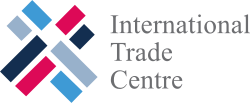This article has multiple issues. Please help improve it or discuss these issues on the talk page . (Learn how and when to remove these messages)
|
 | |
| Abbreviation | ITC |
|---|---|
| Predecessor | International Trade Information Centre |
| Formation | 1964 |
| Type | Intergovernmental organization |
| Legal status | Active |
| Purpose | To foster inclusive and sustainable economic development |
| Headquarters | Geneva, Switzerland |
| Coordinates | 46°13′03″N6°08′29″E / 46.217429°N 6.141458°E |
Region | Worldwide |
| Methods | Education, Publications, Training, Knowledge dissemination |
| Fields | International development, Economic development |
Executive Director | Pamela Coke-Hamilton [1] since July 2020 |
Parent organization | World Trade Organization United Nations |
| Budget | CHF 116.24 million [2] (2017) |
| Staff | 299 [2] (2017) |
| Website | www.intracen.org |
| | |
The International Trade Centre (ITC) (French : Centre du commerce international (CCI)) is a multilateral agency which has a joint mandate with the World Trade Organization (WTO) and the United Nations (UN) through the United Nations Conference on Trade and Development (UNCTAD). [3]
Contents
The headquarters of the ITC are in Geneva, and the agency employs around 300 employees from over 80 different nationalities. [4]